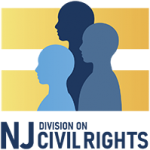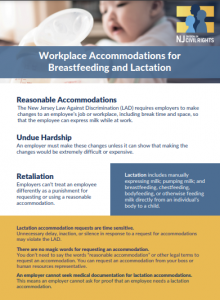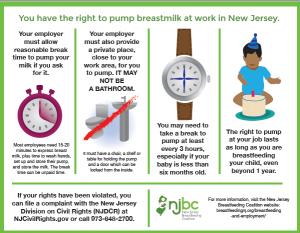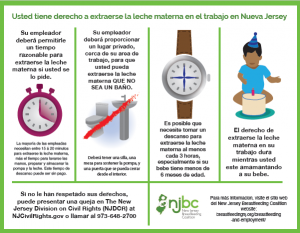Updated February 3, 2025
New Jersey Employees Who Breastfeed Must Be Protected and Accommodated at Work
Continuing breastfeeding after the return to paid employment can be very challenging. If parents will be separated from their babies for several hours a day and wish to provide their breastmilk, it is important for them to express milk at appropriate intervals to maintain the milk supply, to provide sufficient their milk for the child while separated and to keep the breasts healthy and comfortable. Fortunately, both New Jersey law and federal law require rights for breastfeeding and pumping employees who wish to express milk at work.
New Jersey Law on Expressing Milk in the Workplace
Since 2018, the New Jersey Law Against Discrimination (NJLAD) has required the following accommodations and protections for employees to express their milk in the workplace:
- All employers* must provide reasonable accommodations to breastfeeding employees which include reasonable break time and a private place to pump other than a toilet stall, that is in close proximity to the employee’s work area. The law does not contain an age limit on the child who is being provided the pumped milk.
- “Breastfeeding” is now a protected class under the NJ Law Against Discrimination (N.J.S.A. 10:5-12) (LAD), so it is illegal to discriminate against, harass or retaliate against a person in employment on the basis of their breastfeeding status.
(P.L.2017, Chapter 263) *All New Jersey employers are covered by the NJLAD except certain federal government employers and independent contractors. If you think your pumping rights have been violated, you can file a complaint at the NJ Division on Civil Rights or file a lawsuit in NJ Superior Court.
The New Jersey Division on Civil Rights, the agency which enforces the workplace rights contained in the NJ Law Against Discrimination, has issued detailed guidance on pregnancy and lactation-related rights in the workplace, see: Guidance on Workplace Accommodations for Pregnant, Postpartum, Breastfeeding, and Lactating Employees
 Guidance on Workplace Accommodations for Pregnant, Postpartum, Breastfeeding, and Lactating Employees
Guidance on Workplace Accommodations for Pregnant, Postpartum, Breastfeeding, and Lactating Employees
The NJ Division on Civil Rights recently published new guidelines and an accompanying fact sheet regarding lactation rights for employees under the NJ Law Against Discrimination. These resources provide additional details about employees’ lactation protections that can be used to organize and advocate for NJEA members’ rights.
 For example, the fact sheet provides information about how often an employee may need to pump or express milk: “Lactation is often necessary every 2 to 3 hours and may take at least 15-20 minutes. In an 8-hour shift, an employee may need 2 to 3 breaks of at least 30 minutes to express and store milk” (page 2).
For example, the fact sheet provides information about how often an employee may need to pump or express milk: “Lactation is often necessary every 2 to 3 hours and may take at least 15-20 minutes. In an 8-hour shift, an employee may need 2 to 3 breaks of at least 30 minutes to express and store milk” (page 2).
Handouts From New Jersey Breastfeeding Coalition:
- Employee’s Fact Sheet: Workplace Breastfeeding Rights in New Jersey
- Employer’s Fact Sheet: Workplace Breastfeeding Rights in New Jersey
- Infographic: You have the right to pump breastmilk at work in New Jersey (English) (Spanish)


From the New Jersey Division on Civil Rights:
- Workplace Accommodations for Breastfeeding and Lactation
- 5 Things You Should Know about Accommodations for Pregnancy and Breastfeeding at Work
If you have further questions about the NJ LAD’s protections for pumping in the workplace, contact us at NJBreastfeedingCoalition@gmail.com.
Federal Laws on Expressing Milk in the Workplace
In addition to New Jersey law, federal law also that provides rights to employees. The federal PUMP for Nursing Mothers Act (PUMP Act) was passed in December 2022 to close up gaps in the “Break Time for Nursing Mothers” law. These laws require the following:
- Nearly all employees,** including full time employees (teachers, nurses, farmworkers and others) are entitled to “reasonable break time for an employee to express breast milk for her nursing child “each time such employee has need to express the milk,” for one year after the child’s birth.”
- An employee may file a lawsuit seeking monetary damages against an employer who breaks the law.
- Employers must count pumping time as work time for workers who are paid hourly and eligible for overtime if the employee is not completely relieved from their work duties during the pumping break.
**Airline flight crewmembers are not covered by the PUMP Act. Special rules apply to certain rail carrier and motorcoach employees. Employers with fewer than 50 employees are not subject to the break time requirement if the employer can demonstrate that compliance with the provision would impose an undue hardship, which is determined on a case by case basis.
Additional Resources for Breastfeeding in the Workplace:
- A Better Balance. The PUMP for Nursing Mothers Act: What You Should Know
- A Better Balance & Center for Worklife Law. Talking to Your Boss About Your Pump: New Jersey
- New Jersey Education Association. Lauren Zucker, PhD. Advocating for Members’ Lactation Rights.
- New Jersey Education Association. Lauren Zucker, PhD. Pumping at Work: What All Educators Need to Know.
- US Breastfeeding Committee, Workplace Support in Federal Law
- US Department of Health and Human Services, Office on Women’s Health, Breastfeeding and Going Back to Work
- US Department of Labor, Wage and Hour Division, Fact Sheet #73: Break Time for Nursing Mothers under the FLSA
- US Department of Labor, Wage and Hour Division, Frequently Asked Questions—Break Time for Working Mothers

